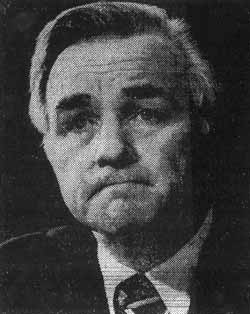Spy Agency Infighting Hurt U.S., Turner
Says
Ex-CIA Director Critical of Rise in
Covert Actions
By Charles R. Babcock
Washington Post Staff Writer
Washington Post, May
13, 1985, p. A3
 |
|
". . . The administration does not understand that oversight of intelligence . . . includes constructive criticism from constructive outsiders like me." — Stansfield Turner |
Former CIA director Stansfield Turner,
who ran the agency during the Carter administration, describes
the U.S. intelligence agencies in a new book as being plagued
by bureaucratic infighting that harmed the nation.
In the 285-page book, "Secrecy and
Democracy, the CIA in Transition," excerpts of which are
being published this week in Newsweek magazine, Turner also is
critical of the Reagan administration for its increased use of
covert action around the world and for what he describes as its
attempt to censor his book by making more than 100 deletions
of material it termed classified.
In one instance of infighting, Turner
wrote, Navy Vice Adm. Bobby Ray Inman, while head of the National
Security Agency (NSA), withheld from the Central Intelligence
Agency important information about the Soviet Navy. Inman did
so on grounds that the information was "tactical" rather
than "national" intelligence, according to Turner.
"This, of course, was a bureaucratic ruse, and the loser
was the United States," Turner wrote.
In another instance, he said, the NSA
and the CIA's clandestine service resisted and defied a presidential
directive to institute a simplified code-word classification
system Turner had initiated.
Turner also said that Defense Intelligence
Agency officials were pressured to produce reports that supported
defense programs. The tug-of-war extended to the White House,
he said, where officials put pressure on the CIA to produce reports
that would help the president politically.
President Jimmy Carter's White House
"was repeatedly insensitive . . . to the importance of protecting
the apolitical credibility of intelligence," he wrote. National
security affairs adviser Zbigniew Brzezinski once asked Turner
to declassify information on the Middle East that would help
Carter, he said.
Of the Reagan administration, Turner
said its model of intelligence seemed to be the Office of Strategic
Services (OSS), where current CIA Director William J. Casey worked
during World War II. "Almost any covert action to help win
the war was considered acceptable, and the more the better,"
he wrote. "Translating that attitude to the peacetime conditions
of the 1980s was a serious mistake."
Turner acknowledged that the Carter administration
used covert action, too. By the end of Carter's term, he said,
a "wide variety of covert operations were in place"
because of the administration's "cumulative frustration"
about Soviet adventurism in Africa and Afghanistan, the fall
of the shah of Iran and the taking of American hostages there.
He saved his harshest words for what
he called the Reagan administration's tardy and arbitrary efforts
to censor his book. He said it took more than 18 months to get
the manuscript cleared. He complained that the CIA made only
three concessions on more than 100 deletions its reviewers required
on security grounds. He also said the agency threatened him with
legal action if he published the disputed information.
Turner, a former admiral, said his attorney
had requested reasons for some of the deletions, which he said
ranged from "borderline issues to the ridiculous,"
or that a court injunction be filed against him so a judge could
resolve the dispute.
The agency's "irresponsible"
response, he said, was that he should do whatever seemed "appropriate,"
but the agency reserved the right "to take whatever action
it deemed appropriate."
"Clearly the Reagan administration
does not understand that oversight of intelligence in our society
includes constructive criticisms from constructive outsiders
like me," he said.
CIA spokesman George Lauder said that
Turner's charges "have no validity." He said Turner's
manuscript was subjected to the same review other authors receive.
"In this instance," Lauder
said, "the review process proved to be more lengthy than
in almost all cases in recent years: Adm. Turner submitted his
manuscript chapter by chapter, he continually revised portions
that had already been approved, and we accommodated him in that
process."
Turner—a controversial director
because of his emphasis on technical collection systems over
spies and his decision to cut 820 positions from the CIA's clandestine
service in 1977—defended his tenure.
"We must never allow the Soviets
to counter our technical-collection capabilities," he said.
"We have grown utterly dependent on them, and in many applications
no amount of human spying can possibly be a substitute."
Turner said the intelligence agencies'
mishandling of a report that there was a Soviet combat brigade
in Cuba was more damaging than their failure to predict the fall
of the shah of Iran. Earlier warning of the Islamic revolution
would not have saved the shah, he said, but negative publicity
over the Soviet brigade played a direct role in killing ratification
of the SALT II arms control treaty. It turned out that the "brigade"
had been in Cuba for nearly 20 years.
Turner's frustrations at trying to control
the various intelligence agencies are illustrated by his efforts,
at Carter's request, to get satellite photographs of a war between
two small, unidentified countries.
It took more than a month before satellites
located the war. An embarrassed Turner, meanwhile, commissioned
the CIA's clandestine service to hire a plane to fly over and
take pictures. The plane crashed in a yam patch, leaving the
agency with a $2 million indemnification bill.
Turner said he found out later that an
aggressive U.S. military attache, who did not know of the president's
request, had taken aerial photos of the war. But the photos were
filed away by the Defense Intelligence Agency because the attache
had had second thoughts about his authority to take them.
"The whole experience humbled me,"
Turner wrote. "It left me wondering what kind of team I
was leading. Here I was, head of the whole intelligence community
of the United States, and I couldn't produce a few pictures of
a Mickey Mouse war."
Home